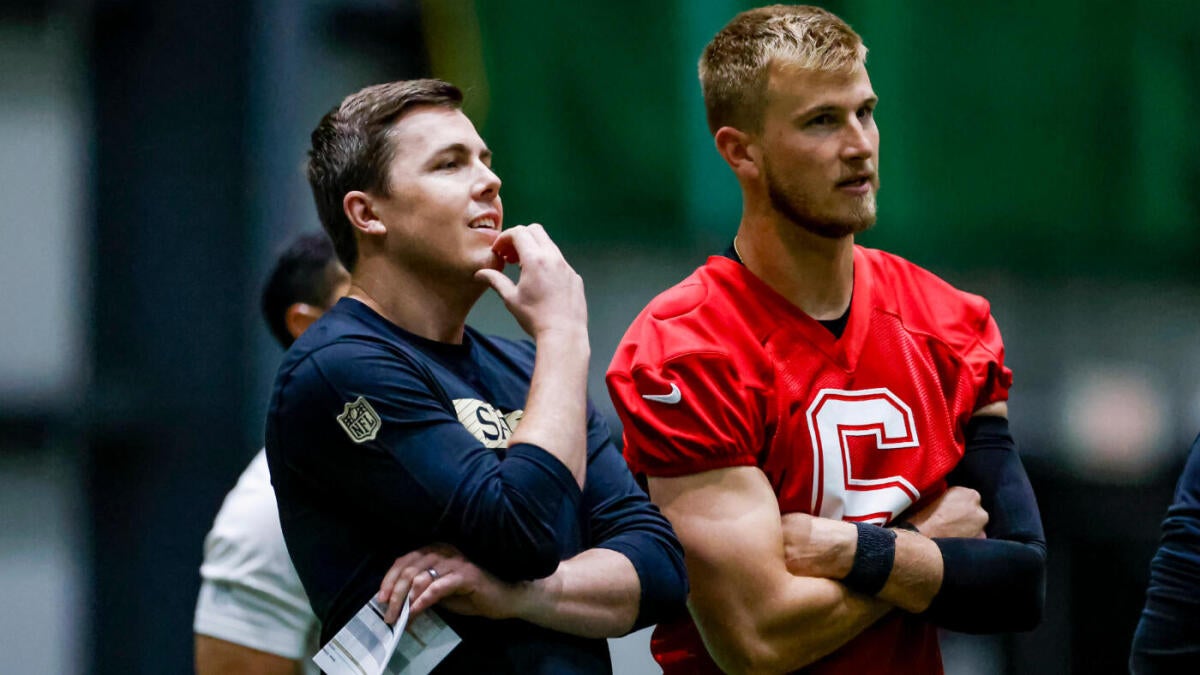Navigating the Saints’ Quarterback Dilemma: Kellen Moore’s Youth-Driven Strategy in Focus
The New Orleans Saints find themselves at a crucial juncture with one of the most pivotal roles in football—the quarterback position—undergoing a substantial shift. The departure of veteran Derek Carr due to injury has left a palpable void, forcing the franchise to lean heavily on youth and internal development. Spearheading this transition is newly minted head coach Kellen Moore, whose philosophy centers around nurturing potential rather than seeking instant veteran fixes. The unfolding narrative offers a revealing lens into modern NFL team-building, emphasizing strategic patience, developmental coaching, and competitive evaluation. This report examines the complex layers of this evolving scenario, from roster composition to coaching infrastructure, while considering fan sentiment and possible alternatives.
The Fallout of Derek Carr’s Unexpected Exit
Derek Carr’s retirement, precipitated by a serious shoulder injury, caught the Saints off guard. Beyond losing a skilled quarterback, the team lost an experienced leader and mentor critical for guiding a young quarterback room. Carr’s blend of steadiness and field awareness was expected to anchor the offense amid new coaching and roster changes. His abrupt absence has translated into a leadership vacuum and has prompted the Saints to rethink their fundamental approach—whether to seek a veteran presence or double down on developing unproven talents.
Embracing Youth: Kellen Moore’s Developmental Blueprint
Kellen Moore’s unwavering stance against acquiring a veteran quarterback signals a deliberate strategic gamble. Instead, he emphasizes confidence in a young trio—Tyler Shough, Spencer Rattler, and Jake Haener—who, combined, barely surpass single-digit NFL starts. Moore promotes a meritocratic environment where performance under live conditions will determine the starter rather than defaulting to safe but short-term veteran options.
This open competition model reflects Moore’s broader coaching ethos: growth through experience, adaptability, and harnessing youthful dynamism. His history of quarterback mentorship, particularly during his tenure with the Philadelphia Eagles, lends credibility to this approach, underscoring faith in coaching as a pivotal ingredient for success.
Who Are the Young QBs?
– Tyler Shough, at 25, carries the promise as a recent draft pick with an appealing mix of youth and demonstrated college success. His pedigree makes him a natural favorite in the developmental race.
– Spencer Rattler, aged 24, offers athleticism and raw talent but lacks polish. His ceiling is high but requires substantial patience and coaching to refine his skillset.
– Jake Haener adds depth and developmental promise, rounding out a young, versatile quarterback room but similarly lacks significant NFL experience.
Each quarterback is unproven at the professional level, which elevates the role of the Saints’ coaching staff as a critical factor in turning potential into performance.
Coaching Infrastructure as a Strategic Asset
Behind this youthful quarterback ensemble stands an experienced quarterback-centric coaching trio. Head Coach Kellen Moore, Offensive Coordinator Doug Nussmeier, and Quarterbacks Coach Scott Tolzien collectively bring a wealth of quarterback knowledge and tactical insight. Their combined playing and coaching experience offers the mentorship and technical refinement necessary to shepherd inexperienced quarterbacks through the NFL’s complexities.
Nussmeier’s reunion with Moore promises offensive cohesion, while Tolzien’s focused quarterback coaching complements the developmental agenda. This infrastructure indicates that the Saints are not merely entrusting youth to chance but are investing systematically in building quarterback competence.
Voices of Caution and Potential Alternatives
Despite the organization’s faith in youth, skepticism persists among segments of fans and media. Critics worry about the lack of seasoned quarterback presence, suggesting a veteran free agent might stabilize the room and provide immediate leadership. Proposals, such as bringing back Teddy Bridgewater in a playing or mentorship role, reflect a desire to hedge against the risks associated with inexperience.
These dissenting views highlight the tension between long-term rebuilding through growth and the NFL’s competitive urgency for immediate results. They underscore the emotional and strategic complexity surrounding quarterback decision-making in the modern NFL.
The Open Competition and Its Implications
Moore’s decision to proceed with a transparent, performance-based quarterback competition embeds meritocracy at the heart of the Saints’ quarterback strategy. Such openness incentivizes the young QBs to push their limits and provides clear assessment criteria for coaches and fans alike.
The competition’s flexibility also permits mid-course corrections if the young QBs fall short, though the current setup favors patience and internal development over quick, external fixes. This approach aligns with a broader organizational rebuilding philosophy emphasizing sustainability and growth.
Envisioning the Saints’ Quarterback Future
This youth-centric quarterback strategy is inseparable from the Saints’ overall rebuilding blueprint, exemplified by recent draft choices and offseason moves. Building around emerging talent and avoiding short-term veteran band-aids reflect a preference for internal cultivation and systemic growth.
Yet, this approach demands strategic patience, effective coaching, and adaptability. The Saints face the challenge of balancing developmental investment against the NFL’s high-stakes, result-driven environment. Success hinges on how swiftly the young QBs mature and the coaching staff’s ability to maximize their potential.
Conclusion: A Risk Worth Betting On
The Saint’s quarterback quandary embodies a bold, forward-looking gamble by Kellen Moore and the franchise—a pivot from veteran security towards an internal, meritocratic solution energized by youth and supported by veteran coaching expertise. While the lack of a proven veteran injects uncertainty, the transparent competition and developmental focus hold promise for forging a new era of homegrown talent.
Should this strategy yield dividends, the Saints may unveil a revitalized team identity built on creativity, resilience, and internal growth. If not, the groundwork and coaching philosophy established now will serve as a resilient blueprint for swift recalibration. The unfolding quarterback saga is compelling evidence of how evolving challenges in the NFL continually reshape team-building philosophies, rewarding those willing to take calculated risks.

